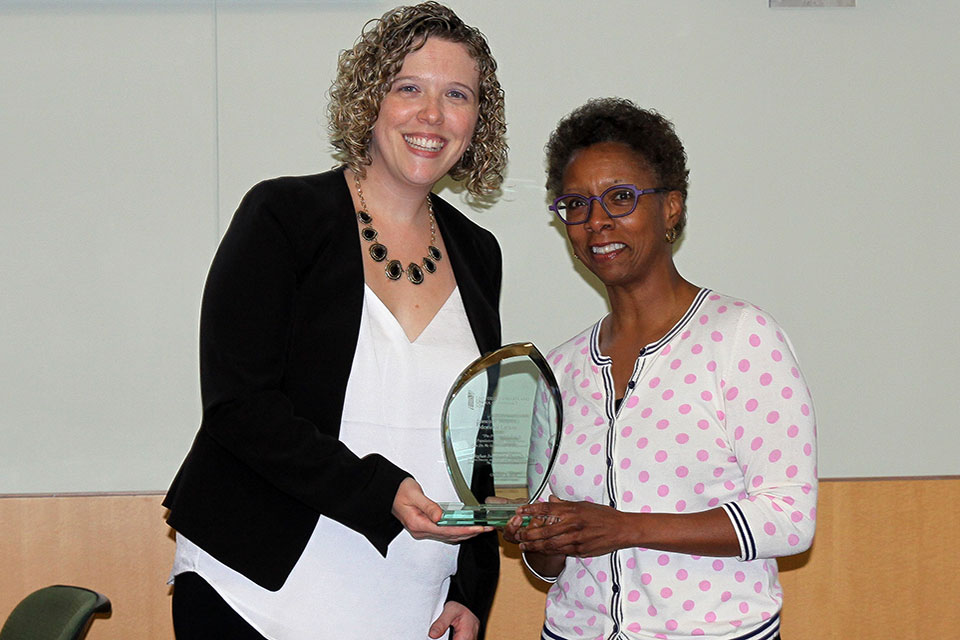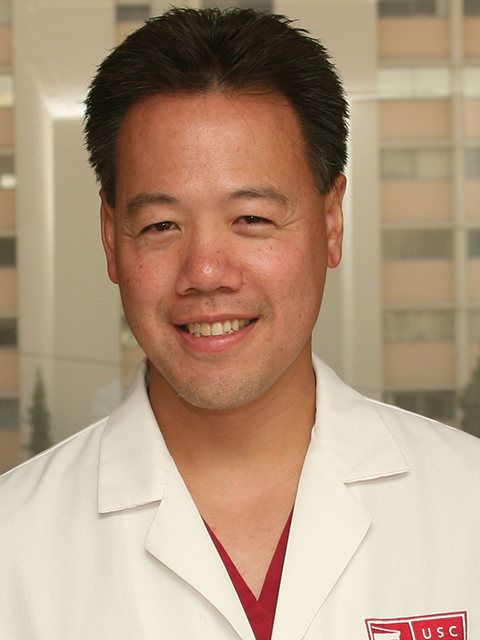Balassone Lecture Stresses Pharmacist’s Role in Personalized Medicine
Dr. John Valgus examines the growing impact of pharmacogenomics and use of individualized therapy during the School of Pharmacy’s annual Francis S. Balassone Memorial Lecture.
By Malissa Carroll
November 8, 2013
It was 1999, and John Valgus, PharmD, BCOP, CPP, was a first-year resident at University of North Carolina (UNC) Hospitals and Clinics. He was attending the American Society of Health-System Pharmacists’ Midyear Clinical Meeting when his residency director, who had just attended a presentation about pharmacogenomics, asked him to present the emerging field to the faculty and staff in his program.
“I had no idea what pharmacogenomics even was,” confessed Valgus, who now serves as lead pharmacist for the Hematology/Oncology Clinical Operating Group at UNC Hospitals and Clinics, as he delivered the University of Maryland School of Pharmacy’s annual Francis S. Balassone Memorial Lecture on Oct. 30.
According to the National Institutes of Health, pharmacogenomics examines how a patient’s genetics affects his or her response to medications. This ever-expanding field combines pharmacology — the science of drugs — and genomics — the study of genes and their functions — to help health care professionals develop effective and safe treatment regimens that are tailored to the patient’s genetic makeup.
Now one of the nation’s leading experts on pharmacogenomics and its use in the treatment of cancer, Valgus encouraged audience members to be proactive about pursuing education in this important field. “Now is the time for you to become familiar with pharmacogenomics and determine how you can best utilize this new science in your practice,” he declared.
Valgus presented two case studies that illustrated the impact that pharmacogenomics can have when appropriately used. One study examined a 10-year old African American female patient who had been prescribed mercaptopurine, a common chemotherapy drug, at a dose much lower than that typically observed by pharmacists. Pharmacogenomic testing revealed that the patient had a genetic mutation that put her at risk for developing life-threatening toxicity if she consumed a full dose of the medication.
Speaking from personal experience in the field of oncology, Valgus explained that when a patient develops toxicity from a medication, the recommended action for health care providers calls for a 10 to 20 percent dose reduction. However, research indicates that patients with the genetic mutation described in the case study often required a 90 percent dose reduction before they can experience the benefits offered by the medication with no toxicity.
Without pharmacogenomic testing, Valgus noted, both the patient and health care provider are at a disadvantage.
“Think about that patient and her family’s confidence in us as health care providers,” implored Valgus. “If that patient has to return to the hospital each time we reduce the dose by 10 or 20 percent because she is still experiencing toxicity, the family may begin to think that we don’t know what we’re doing. As health care providers, we might also begin to lose confidence in the drug — which is very important for cure rates for acute lymphoblastic leukemia — and abandon therapy before we arrive at the 90 percent dose reduction.”
However, Valgus also noted that pharmacogenomics should not be the only piece that health care professionals consider when developing a patient’s treatment plan.
“There are a number of factors that influence how patients respond to their medications, including drug interactions, adherence, diagnosis, and dose,” said Valgus. “When I talk about individualized therapy, I am talking about all of these factors together. Just because we have some information about the patient’s genetics doesn’t mean that we should put our blinders on and focus on that information alone. Instead, that information should be integrated with all of the other things that we know about how to properly manage patients’ medications.”
As the experts in pharmacotherapy, Valgus argued that pharmacists could play an important role as clinicians in the implementation of pharmacogenomics as the standard of care. He also emphasized pharmacists’ ability to further assist with the implementation of this new science as both educators and researchers.
“As pharmacists, you know about the medications and the disease states,” said Valgus. “You know about all of the things that can alter those treatment regimens and you have an in-depth knowledge of pharmacology. You are in the perfect position to be the one educating other health care professionals and conducting pharmacogenomics-related research.”
Though he admitted there is a “knowledge gap” that currently exists in the pharmacy profession about pharmacogenomics, Valgus remains hopeful that, as schools of pharmacy across the country continue to develop pharmacogenomics curricula and new pharmacists become more familiar with the science, the impact of this field on the treatment of patients with a broad range of diseases will continue to grow.
“There is a high probability that we are going to need individualized therapy across a broad range of disease states,” concluded Valgus. “There are already some current examples where it has been implemented in daily practice. And, I hope that after hearing this lecture, you know that now is the time to start thinking about this. Now is the time to get educated about this.”



